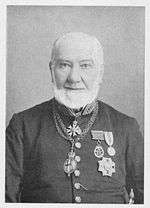Albert Woods

Sir Albert William Woods GCVO KCB KCMG KStJ FSA (16 April 1816 – 7 January 1904) was an English officer of arms. The Woods family has a firm tradition at the College of Arms. Albert Woods was the son of Sir William Woods, Garter Principal King of Arms from 1838 until his death in 1842. Likewise, the grandson of Albert Woods was Sir Gerald Woods Wollaston, who also rose to the rank of Garter Principal King of Arms and served there from 1930 until 1944.
Heraldic career
Woods' first heraldic appointment came in 1837 when he served as Fitzalan Pursuivant of Arms Extraordinary at the coronation of Queen Victoria. In 1838 Woods became a member of the chapter of the College of Arms when he was appointed Portcullis Pursuivant of Arms in Ordinary. After a short appointment as Norfolk Herald of Arms Extraordinary, Woods was promoted to the office of Lancaster Herald of Arms in Ordinary in 1841. This position was held until 1869, when he was appointed Garter Principal King of Arms, a position he held until his death 35 years later.
From 1866, Woods was registrar of the College of Arms. At his appointment as Garter Principal King of Arms, he was also named the King of Arms of the Order of St Michael and St George. In 1878, he was made registrar of the Order of the Star of India and the Order of the Indian Empire. Woods also officiated at the coronations both of Queen Victoria and of Edward VII.
Woods's eye for heraldic design has been deprecated by some heraldists. In his Complete Guide to Heraldry, Arthur Fox-Davies refers to his designs as "wretched", "unsuitable" and "abortions". He is particularly critical of the crests granted by Woods, which frequently incorporated tree trunks, either in front of the crest or underneath it, a practice Davies considered unheraldic.[1]
"Garter's Ordinaries"
Woods was responsible for the compilation of the important unpublished ordinary of arms (a systematic register of coats of arms) known as "Garter's Ordinaries". He began work on it in 1842 and continued until his death in 1904. By that date the ordinary comprised two series, one of five and the other of six volumes, plus indexes. Following his death it was donated to the College of Arms by his grandson, Gerald Woods Wollaston: since then, subsequent Garter Kings of Arms have added to it and kept it up to date by including within it new grants of arms. It remains in use: Sir Anthony Wagner has described it as "an indispensable tool at the College".[2]
Honours and appointments
- 1837 - Fitzalan Pursuivant of Arms Extraordinary
- 1838 - Portcullis Pursuivant of Arms in Ordinary
- 1841 - Norfolk Herald of Arms Extraordinary
- 1841 - Lancaster Herald of Arms in Ordinary
- 1869 - Knight Bachelor
- 1869 - Garter Principal King of Arms
- 1897 - Knight Commander of the Order of the Bath
- 1899 - Knight Commander of the Order of St Michael and St George
- 1903 - Knight Grand Cross of the Royal Victorian Order[3]
See also
References
- ↑ Fox-Davies, Arthur (1909). Complete Guide to Heraldry. London: T.C. & E.C. Jack.
- ↑ Wagner, Anthony (1952). The Records and Collections of the College of Arms. London: Burke's Peerage. pp. 50–51.
- ↑ The London Gazette: no. 27570. p. 4073. 30 June 1903. Retrieved 2007-11-15.
External links
| Heraldic offices | ||
|---|---|---|
| Preceded by James Pulman |
Portcullis Pursuivant 1838 – 1841 |
Succeeded by George William Collen |
| Preceded by Sir George Frederick Beltz |
Lancaster Herald 1841 – 1869 |
Succeeded by George Edward Cokayne |
| Preceded by Sir Charles George Young |
Garter King of Arms 1869 – 1904 |
Succeeded by Sir Alfred Scott Scott-Gatty |